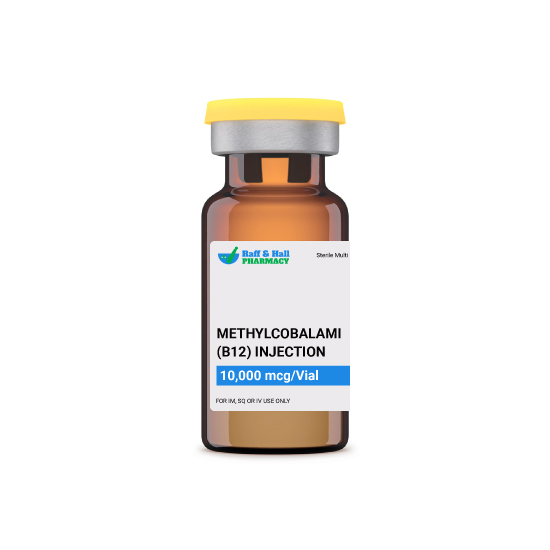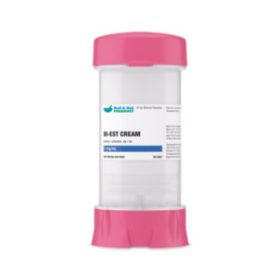This product is available solely through our 503A Compounding Pharmacy, ensuring personalized care and precision in every order. Please note that a valid prescription is required for purchase. If you do not have an account, please contact us.
Methylcobalamin Injection (Lyo) (Each)
It plays a crucial role in nerve function, red blood cell formation, and DNA synthesis. Methylcobalamin injections are often prescribed for patients with pernicious anemia, neuropathy, chronic fatigue, or malabsorption conditions (e.g., after gastric surgery or in gastrointestinal disorders). It is preferred over cyanocobalamin in neurological conditions due to its better uptake in nerve cells.
Mechanisms of Action:
It also supports the myelination of nerve fibers, making it particularly beneficial in treating neurological symptoms associated with B12 deficiency. Unlike cyanocobalamin, methylcobalamin is already in its active form, which may offer faster therapeutic effects, especially in nervous system disorders.
Contraindications & Precautions:
Methylcobalamin injections are contraindicated in individuals with hypersensitivity to cobalamin or any excipients in the injection. It should be used with caution in patients with Leber’s disease (hereditary optic nerve atrophy), as it may precipitate optic nerve damage. Patients should also be monitored for hypokalemia during rapid correction of severe anemia, and for polycythemia vera, where B12 may mask symptoms.
Interactions:
Excessive alcohol intake and long-term use of these drugs may lead to B12 deficiency over time. Potassium supplements may also reduce Vitamin B12 absorption, so concurrent use should be monitored carefully.
Adverse Reactions / Side Effects:
Methylcobalamin injections are generally well-tolerated. v Rarely, allergic reactions such as rash, itching, or anaphylaxis may occur. In some cases, hypokalemia may develop as a result of increased red blood cell production during treatment of severe anemia, which should be monitored with blood tests.
Pregnancy category C is assigned to parenteral methylcobalamin. Though no maternal or fetal problems have been related, adequate human investigations have not yet been carried out. With recommended doses throughout pregnancy, pregnant women with vitamin B12 sensitive anemias should not be denied proper care. Conversely, poor outcomes from pregnancy or infertility may follow from harmful anemia caused by vitamin B12 deficiency. Breastfed infants of vegetarian mothers whose diets contained no animal products (such as eggs, dairy) had Vitamin B12 deficiency even if the mothers had No evidence of deficiency at the moment. During pregnancy, maternal vitamin B12 requirements rise. During pregnancy, methylcobalamin and vitamin B12 should be consumed in the usual daily suggested amounts either via food intake or via supplementation.
Distribution into breast milk, which enables appropriate methylcobalamin intakes by breastfeeding infants, is comparable to those in maternal plasma. During nursing, good maternal consumption is essential for the mother as well as the baby; maternal needs for vitamin B12 rise when lactation occurs. The manufacturer suggests that breastfeeding women take the usual daily recommended amounts of methylcobalamin, vitamin B12 maternally (see Dosage). Vitamin B12 is deemed to be breastfeeding friendly by the American Academy of Pediatrics. Think about the advantages of breastfeeding, the danger of possible baby medicine exposure, and the danger of an unmanaged or poorly treated disease. Healthcare professionals are asked to alert the FDA of any negative side effect a breastfeeding baby shows related to a maternally swallowed medicine.
Store dry powder at 68°F to 77°F (20°C to 25°C) and away from heat, moisture and light. Once reconstituted keep this medicine in a refrigerator between 36°F to 46°F (2°C to 8°C). Keep all medicine out of the reach of children. Throw away any unused medicine after the beyond-use date. Do not flush unused medications or pour down a sink or drain.





